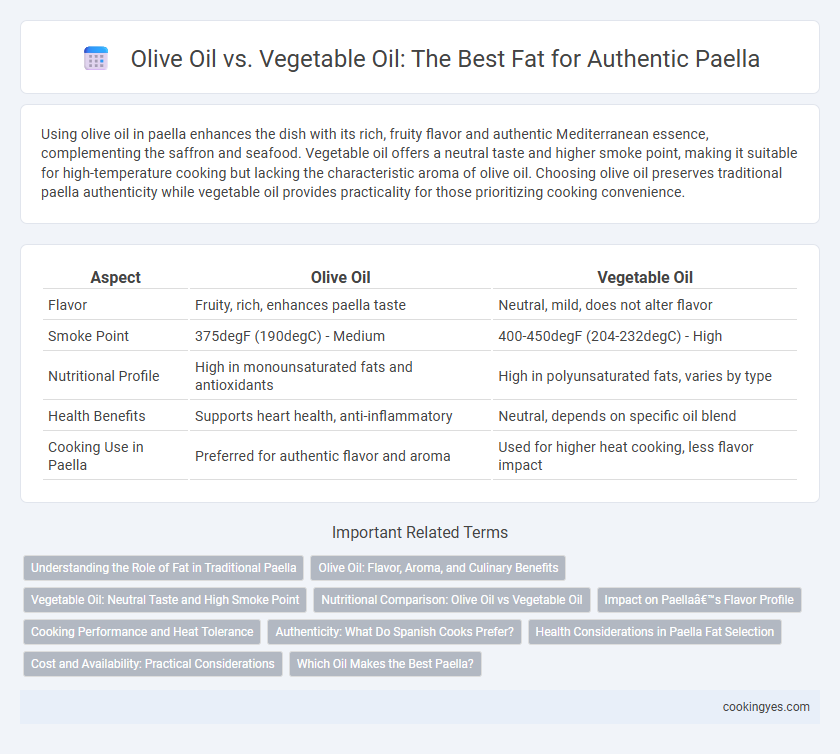Using olive oil in paella enhances the dish with its rich, fruity flavor and authentic Mediterranean essence, complementing the saffron and seafood. Vegetable oil offers a neutral taste and higher smoke point, making it suitable for high-temperature cooking but lacking the characteristic aroma of olive oil. Choosing olive oil preserves traditional paella authenticity while vegetable oil provides practicality for those prioritizing cooking convenience.
Table of Comparison
| Aspect | Olive Oil | Vegetable Oil |
|---|---|---|
| Flavor | Fruity, rich, enhances paella taste | Neutral, mild, does not alter flavor |
| Smoke Point | 375degF (190degC) - Medium | 400-450degF (204-232degC) - High |
| Nutritional Profile | High in monounsaturated fats and antioxidants | High in polyunsaturated fats, varies by type |
| Health Benefits | Supports heart health, anti-inflammatory | Neutral, depends on specific oil blend |
| Cooking Use in Paella | Preferred for authentic flavor and aroma | Used for higher heat cooking, less flavor impact |
Understanding the Role of Fat in Traditional Paella
Olive oil, rich in monounsaturated fats and antioxidants, enhances the authentic flavor profile of traditional paella, complementing the saffron and seafood notes while providing a smooth texture. Vegetable oil, often neutral in flavor and higher in polyunsaturated fats, can alter the taste and mouthfeel, potentially masking the dish's signature aromatic spices. Understanding the role of fat in paella involves recognizing olive oil's contribution to the Maillard reaction, essential for creating the characteristic socarrat crust and depth of flavor.
Olive Oil: Flavor, Aroma, and Culinary Benefits
Olive oil enriches paella with its distinctive fruity flavor and robust aroma, enhancing the dish's traditional Mediterranean profile. Its high antioxidant content contributes to healthier cooking and preserves the vibrant colors of saffron and vegetables in paella. Using extra virgin olive oil also provides a smooth texture and depth of taste that vegetable oils often lack, making it the preferred fat for authentic paella recipes.
Vegetable Oil: Neutral Taste and High Smoke Point
Vegetable oil is often preferred for paella due to its neutral taste, which allows the rich flavors of saffron, seafood, and vegetables to shine without interference. Its high smoke point, typically around 400-450degF (204-232degC), ensures stable cooking at the high heat required to achieve the perfect socarrat, the crispy-bottomed crust. Unlike olive oil, vegetable oil's neutral profile prevents overpowering the dish, making it ideal for frying ingredients and maintaining the authentic texture of traditional paella.
Nutritional Comparison: Olive Oil vs Vegetable Oil
Olive oil is rich in monounsaturated fats and antioxidants, contributing to heart health and anti-inflammatory benefits, whereas vegetable oil often contains higher levels of polyunsaturated fats and omega-6 fatty acids, which in excess may promote inflammation. Extra virgin olive oil contains vitamin E and polyphenols that enhance the nutritional profile of paella, while many vegetable oils undergo refining processes that reduce nutrient density. Choosing olive oil for paella not only enhances flavor but also provides a healthier fat composition compared to most vegetable oil blends.
Impact on Paella’s Flavor Profile
Olive oil enhances paella's flavor profile with its fruity and peppery notes, imprinting a distinct Mediterranean character that complements the saffron and seafood. Vegetable oil offers a neutral taste, allowing the other ingredients' flavors to shine without interference, which is ideal for paellas emphasizing delicate seafood or subtle seasoning. The choice between olive oil and vegetable oil significantly influences the dish's aromatic complexity and overall taste balance.
Cooking Performance and Heat Tolerance
Olive oil is preferred for paella due to its robust flavor and higher heat tolerance, which allows for even cooking and the authentic caramelization of ingredients. Vegetable oil, with a higher smoke point, offers a neutral taste but may lack the depth of flavor essential for traditional paella. The choice between olive oil and vegetable oil significantly impacts the dish's final texture and aroma, influencing both cooking performance and heat stability.
Authenticity: What Do Spanish Cooks Prefer?
Spanish cooks prefer olive oil for authentic paella due to its distinct fruity flavor and cultural significance in Mediterranean cuisine. Olive oil enhances the traditional taste profile, maintaining the dish's regional integrity, whereas vegetable oil lacks the nuanced aroma essential to classic recipes. Using extra virgin olive oil aligns with historic practices, ensuring a more genuine and richly flavored paella.
Health Considerations in Paella Fat Selection
Olive oil, rich in monounsaturated fats and antioxidants, supports heart health and offers anti-inflammatory benefits, making it a superior choice for paella fat selection compared to vegetable oil. Vegetable oils, often higher in omega-6 polyunsaturated fats, may contribute to inflammation when consumed in excess, potentially impacting overall cardiovascular health. Choosing extra virgin olive oil enhances the nutritional profile of paella while preserving its traditional Mediterranean flavor.
Cost and Availability: Practical Considerations
Olive oil, known for its distinctive flavor and health benefits, tends to be more expensive and less readily available in large quantities compared to vegetable oil, which is often preferred for cost-efficiency and wide availability in grocery stores. Vegetable oil offers a neutral taste, making it a practical choice for everyday paella preparation while keeping ingredient costs low. For traditional paella enthusiasts, investing in extra virgin olive oil enhances authenticity despite the higher price and occasional supply limitations.
Which Oil Makes the Best Paella?
Olive oil is traditionally preferred for paella due to its rich flavor and ability to bring out the dish's authentic Mediterranean taste, while vegetable oil offers a neutral profile and higher smoke point, making it suitable for high-heat cooking. The choice of oil affects the overall flavor and texture, with extra virgin olive oil enhancing the dish's complexity but potentially overshadowing delicate ingredients. For the best paella, balancing heat tolerance and flavor intensity suggests using high-quality extra virgin olive oil in moderate amounts to preserve authenticity without burning.
Olive Oil vs Vegetable Oil for Paella fat Infographic

 cookingyes.com
cookingyes.com